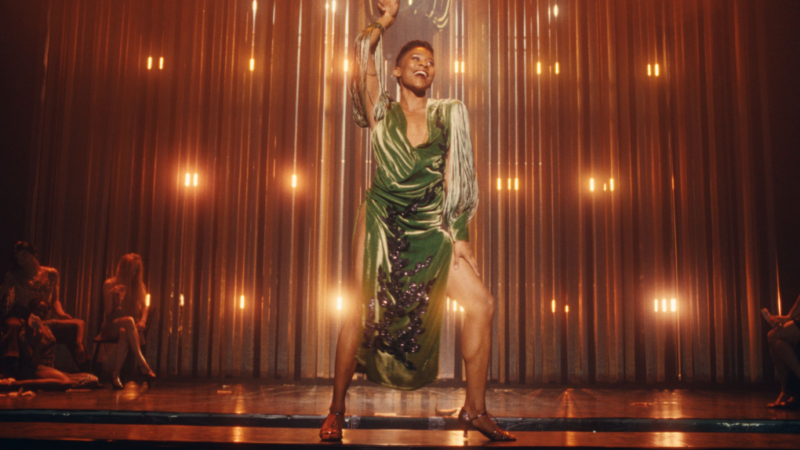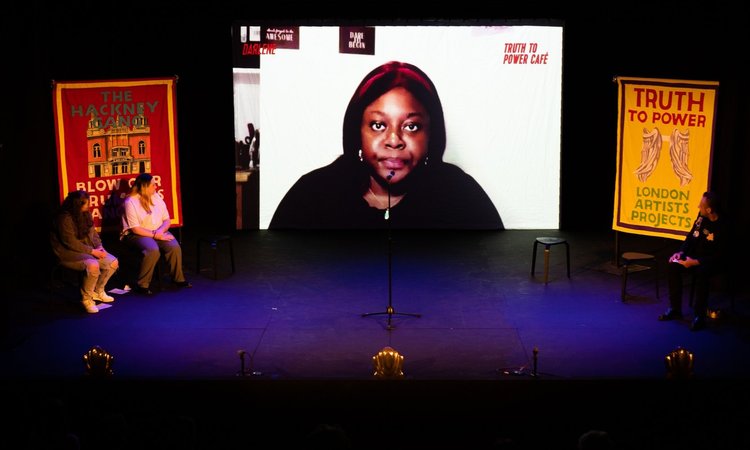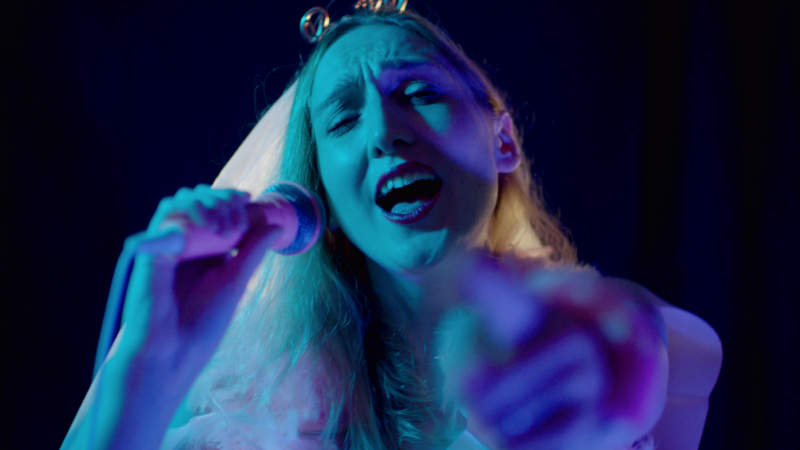Exploring how the award-winning charity Streetwise Opera and world-renowned music ensemble The Sixteen worked with The Space to bring their production of The Passion to online and TV audiences.
You have a unique piece of promenade theatre on your hands and you want to capture it and share it as widely as possible – how do you do it? This case study explores how the award-winning charity Streetwise Opera and world-renowned music ensemble The Sixteen worked with The Space to bring their exceptional production of The Passion to online and TV audiences.
Bringing it to life
Streetwise Opera help people who have experienced homelessness to change their lives for the better through music. For Easter 2016 Streetwise brought the story of the last days of Jesus’ life to Manchester, in collaboration with The Sixteen and HOME, Manchester’s contemporary arts centre. In the city’s Campfield Market, an abridged version of Bach’s St Matthew Passion was brought to life as an immersive fully-staged opera. In this promenade performance, audiences were led around Manchester’s Victorian hall by a cast comprising both The Sixteen and performers who have experienced homelessness from Streetwise Opera Manchester. The production was directed by filmmaker, director and screenwriter Penny Woolcock and featured a ‘resurrection’ finale which was jointly written by Streetwise Opera’s performers and composer Sir James MacMillan.
The Passion was the biggest production Streetwise Opera had ever staged. However, due to the difficulties and expense of touring, only two performances were possible. This meant the live show could only be seen by a maximum of 800 people.
With the hope of increasing the audience for The Passion, Streetwise Opera applied to The Space to fund a live capture of the production and was commissioned under The Space’s Capture strand.
For Streetwise, the aims of the digital capture were to:
- Reach a much wider public through a high-quality capture of the show
- Raise the profile of participatory arts projects
- Promote positive attitudes to people who have experienced homelessness
- Give the performers a further sense of achievement around the project
The Space wanted to help Streetwise Opera to reach a bigger audience with The Passion, and to help the charity grow its modest social media channels to help with longer term sustainable audience development.
This case study is based on interviews with The Space’s Commissioning Executive Helen Spencer, Streetwise Opera’s Co-Executive Director Susie Gorgeous, Multicamera Director Ross MacGibbon and The Space’s Head of Audience Development and Distribution Owen Hopkin.
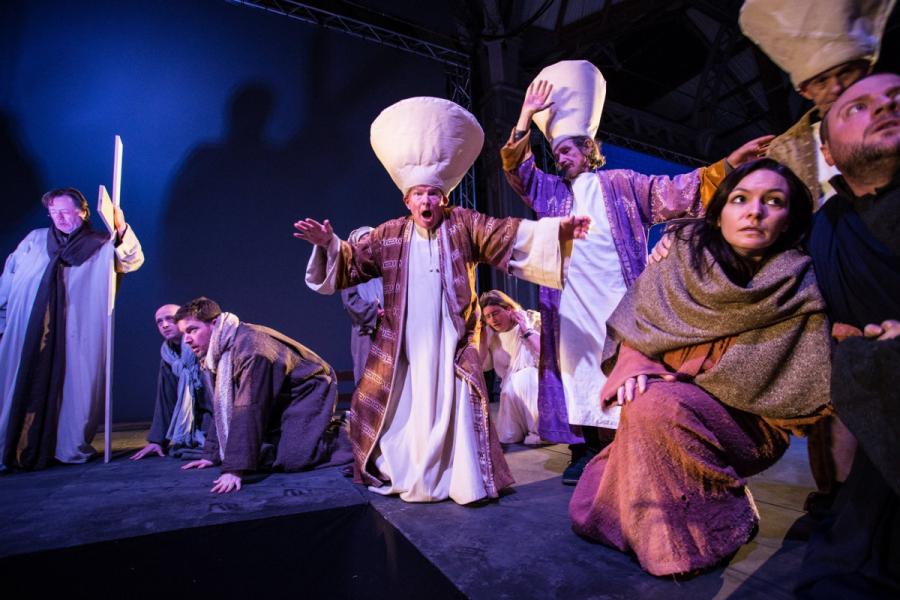
Approach
Broadcast date:
The BBC were interested in the project for its Easter weekend programming, so the potential for the project to reach large audiences was clear. The Passion was a tight turnaround project – the show was performed on the Friday and Saturday of Easter weekend, and the BBC wanted to broadcast an hour-long cut-down version on BBC Four less than 24 hours later. The Passion’s source material – Bach’s St Matthew Passion – with its themes of redemption and hope – made Easter Sunday the ideal day for broadcast. The Space’s Head of Audience Development Owen Hopkin emphasised that it is always worth thinking about whether a show has a ‘hook’ – an event, an anniversary or a news peg – that a marketing strategy and a broadcast can be built around.
Capturing a promenade production:
Riverside Studios were appointed as the production company for the capture. Promenade productions throw up more challenges for a film team than capturing a show in a traditional setting like a proscenium arch theatre because the performers, camera team and audience are all sharing the same space. Director Ross MacGibbon stressed that the audience are an unknown force – the crew doesn’t know where they are going to stand, or how they are going to move or react. In The Passion, there was also an additional filming team shooting footage for the screens that formed the set which meant more cameras and more bodies on the floor.
Due to the challenges of capturing a promenade performance, all the interviewees agreed that it is good for the creative teams – especially the stage and multicamera directors – to meet early in the process. The Space’s Commissioning Executive Helen Spencer suggested that an arts organisation might want to meet several directors to find the one who truly ‘gets’ their artistic vision. As a Multicamera Director, Ross said his aim is always to showcase the intentions and choices of the stage director. Therefore, he needs to tap into the stage director’s vision for the show in order to plan how he will translate it onto film. (See capture director process box, below).
To capture a promenade performance, cameras need to be able to follow action that is happening all around them, not only in front of them. There are also additional challenges around the lighting and sound to make sure that all the performers are lit and audible as they move through the location. A TV sound producer rigged microphones at important points across Campfield Market as well as in the orchestra pit for The Passion and put radio mics on key performers. Getting the sound mix right was crucial for everyone involved, and the Streetwise team were particularly delighted by how the show sounded. Additionally, a TV lighting director came in and worked with the lighting designer to ensure the lighting was camera-ready ahead of the capture. Any screens on stage should also be technically compatible with the TV cameras so the cameras can ‘see’ anything that appears on the screens and capture it.
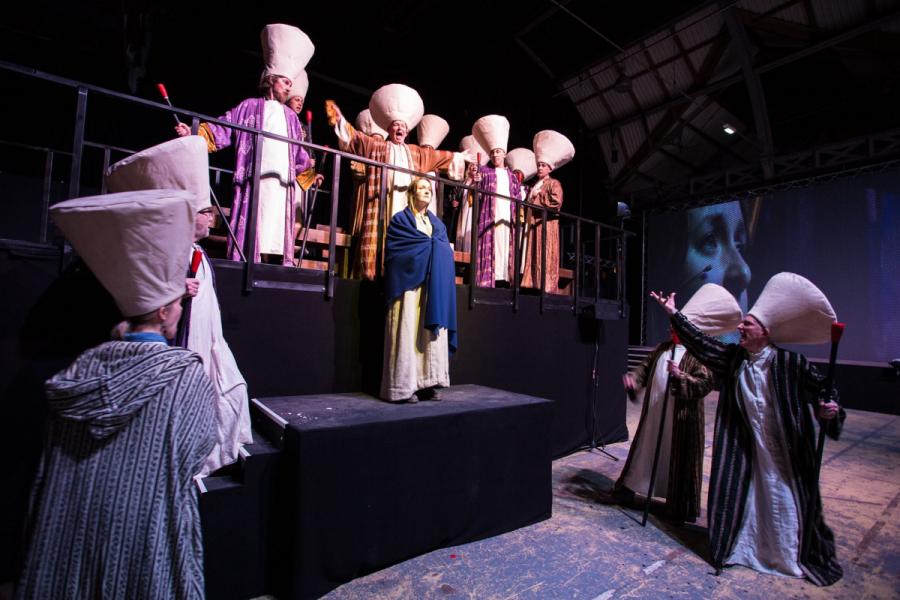
LIVE CAPTURE DIRECTOR PROCESS, as outlined by Multicamera Director Ross MacGibbon
- The capture director watches the live show. If this is not possible, the director will use the script, stage plans and score and watch some rehearsals to see how the show is blocked.
- Based on this assessment, the director will decide how many cameras are needed.
- The director will then recce the venue with their production manager, engineering manager and front of house to discuss camera positions. Depending on the director’s desired camera positions and technical requirements for cabling, camera positions will be fixed and ‘seat kills’ will be established. Seat kills are the seats that are lost in a venue because of cameras, meaning they will be taken up and cannot be put on sale.
- The sound producer will think about how to rig the venue to capture the performers and any musicians.
- If the show is already running, the director will ask for a ‘scratch tape’ to be filmed – this is a wide shot of the whole show recorded from the back of the venue that the director can base her/his camera script on.
- The capture director scripts every shot in the performance. This is the key moment for the director and when she/he makes creative decisions to enhance the storytelling and impact of the show. If the she/he has any questions about the stage director’s intentions, they will be discussed so the capture director is sure she/he is clear about what the focus should be in that sequence.
- Meanwhile, the TV lighting director will look at the show and work with the stage team to tweak anything that needs to be altered to be ‘seen’ by the cameras.
- The script supervisor will take the director’s script and translate it into a TV script, creating camera cards for each cameraman with each of their shots listed on them.
- The camera team will then meet with the director so she/he can talk through the show shot by shot.
- Shoot a camera rehearsal of the show.
- After the camera rehearsal, the director will spend time ‘fixing’ the TV script based on the output of the camera rehearsal, improving shots and cuts. Camera cards and camera scripts will be updated.
- FILM!
Timing:
Time was one of the major challenges on The Passion – there were only two performances so the capture director was unable to see a scratch tape to script from (he worked from the score and attended rehearsals, during which he shot some scenes on his own camera as a basis for the script) and there was only 24 hours between the first and second performances to iron out any necessary ‘fixes’. Ross said that it is useful for theatre teams to bear in mind how much time any crew will have available, both before a performance and after their camera rehearsal, when thinking about capturing a show.
Briefing performers and audiences:
As Streetwise Opera is a charity that works with some vulnerable people who have experienced homelessness, it was important for them to brief their performers that the show was being filmed as early as possible and continue to brief them about every stage of filming. Susie Gorgeous, Streetwise Opera’s Co-Executive Director, said that she had been slightly nervous about how their performers would react to the cameras and any sense of extra pressure on the show. In the event, she says: “They absolutely rolled with it.”
Helen said it is also important to make the live audience aware that cameras will be filming, especially for promenade productions due to health and safety considerations. For The Passion, the team booked additional crew to clear space around the cameras and the cameramen as they moved through the audience.
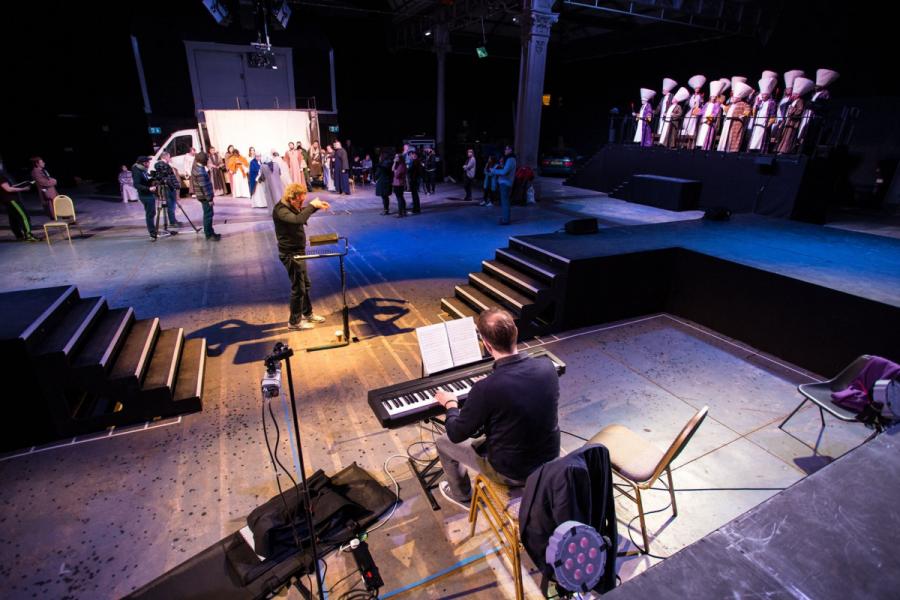
Engaging the audience
Given its subject matter and history, everything about The Passion pointed to Easter being the obvious point for the show to be broadcast. Owen uses Google Keyword searches to explore how volumes of searches around topics vary across a calendar year, and in this case a Google Keyword search confirmed a spike in searches for St Matthew Passion in March/April every year, clearly in line with Easter. BBC Four chose the transmission date as they wanted to broadcast the piece over the Easter weekend but Owen emphasised this timing would have always been the best time to reach audiences.
The distribution platforms for The Passion were:
- BBC Four: an edited, hour-long version to be broadcast on Easter Sunday, followed by a 30- day catch up period on BBC iPlayer
- Streetwise Opera’s YouTube channel: an unedited version uploaded after the BBC Four broadcast
- The Guardian’s website: Streetwise’s YouTube embedded on the newspaper website
- The YouTube video was also picked up and embedded by other websites including Norman Lebrecht’s Slipped Disc blog and others.
The audience metrics that The Space was most interested in for this project were:
- The BBC viewing figures around broadcast, and 30-day catch-up window on BBC iPlayer
- Number of views and average length of viewing time on YouTube
- Impact on social media channels, to be measured through engagement and follower/fan number on different platforms and number of views of the trailer on Facebook.
There were a lot of different angles that could be explored in the marketing of the production – hooks around the composer of the new requiem Sir James MacMillan, around Bach and the St Matthew Passion, around the charity’s work and its participants and around The Sixteen. The strategy was to create different content and messages that would work for different audiences Streetwise wanted to engage in the production. This translated into a high-impact short trailer and graphics with quotes from some of the performers that could be shared online as well as traditional press.
Streetwise Opera’s social media channels had modest reach so only a small budget was needed to boost those channels and target audiences. The marketing team promoted posts about The Passion using Facebook targeting. Owen said: “Through Facebook targeting and Instagram it is relatively easy to find an audience that you want and it is relatively cost effective.”
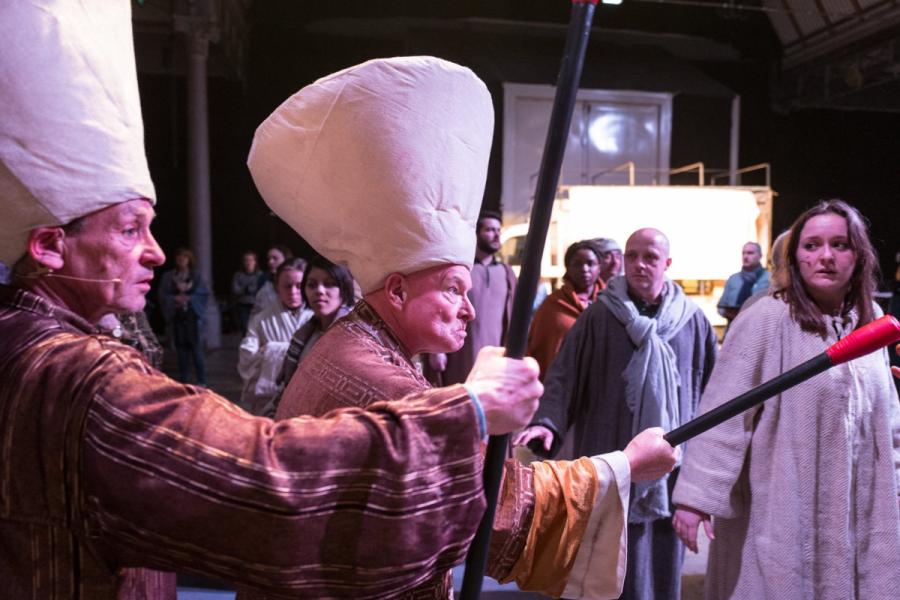
Outcomes
Across all platforms it is estimated that 140,000 people saw The Passion, 140 times the number that could have attended the live shows, greatly increasing its audience. Thanks to the targeting marketing campaign, there were also large increases in engagement in Streetwise Opera’s social media channels –
- During March 2016, Streetwise Opera’s Facebook reach rocketed 562% as compared with the previous month. Facebook engagement increased 561% in the same period.
- Streetwise Opera’s YouTube views were 706% higher in March 2016 than in February. This boost continued into April, where the channel registered a 320% increase in views compared in February.
- Twitter impressions were up 200% in March, and 123% in April, both as compared to a February 2016 base level.
The Passion was streamed again in 2017 on BBC Arts Online and Streetwise Opera’s YouTube channel, again pegged to Easter– demonstrating that a strong hook can be a useful marketing angle long after the original event. And the Opera Platform have also taken the full piece to stream.
On the back of the BBC Four broadcast, the charity also received donations from new donors. This was a completely unexpected outcome but shows the power of the work and of platforms where the capture was shown to engage with audiences on an emotional level.
The broadcast of the production was a real thrill for Streetwise’s performers. As one Streetwise Opera staff member described: “People, instead of being seen as the failure in the family, have been seen as this amazing person who’s been on the telly, and who’s done this incredible performance. That’s really important, long term, the impact it’s going to have.”
Top tips: Promenade performance capture
- Ensure the creative teams meet early in the process, especially the stage and multicamera directors.
- Ensure there is plenty of rehearsal time in the schedule, factoring in any additional camera rehearsals
- In promenade performances, the performers, stage crew, TV crew and cameras and audience are all sharing the same spaces – set out ground rules at the beginning of the process and a clear line of command to make this work for everyone.
- Be aware that there may be slight compromises to the live performance in order for the capture crew to do what they need to do/get the material that they need.
- Usually, stage lighting needs to be tweaked in order that TV cameras can capture the action.
- Make sure any additional technical requirements on stage (screens, digital sets, projections etc.) will be compatible with TV cameras – for example LED screens are much easier for TV cameras to ‘see’.
- Brief your performers and live audience that certain performances are being filmed so they can be aware of the cameras during the live recording and manage any expectations. Audiences can be notified by letting audiences know when they book for that performance, notices on theatre doors and/or a short audio announcement before the show begins.
- Think carefully about when the best time is to broadcast your show – think through any seasonal or news hooks that could be used to market it to audiences and consider doing a Google Keyword search to give you more information about when the public are interested in certain pieces/themes.
- Look at who is already in your social media networks to see if they can bring other audiences to you. Tools like Social Authority show Twitter users how influential their followers are on the site.
- To engage new audiences, it’s also a good idea to think about who isn’t in the company’s social media networks who would be interested in the production. On sites such as Followerwonk, you can search Twitter profiles to find the audience you want to engage: for example, to search for people who are in interested in opera and live in Manchester.
Quotes
“I would say to other arts organisations – go for it, if you can. It was very exciting for the performers and very exciting for Streetwise Opera.” Susie Gorgeous, Streetwise Opera Co-Executive Director
“The ambition and fast turnaround nature of the production definitely threw up challenges but the reward of seeing the performers and audience’s reaction to The Passion made it well worth the effort and gave Streetwise the chance to showcase this unique work far beyond the 800 who saw the live show. 140,000 viewers so far and the journey is far from over.” Helen Spencer, The Space Commissioning Executive
More information:
Streetwise Opera
Trailer for The Passion
About Streetwise Opera
Streetwise Opera is an award-winning charity that uses music to help people make positive changes in their lives. Working with people who have experienced homelessness and other members of the community, we run workshop programmes across England and stage critically-acclaimed operas.
How useful was this resource?

